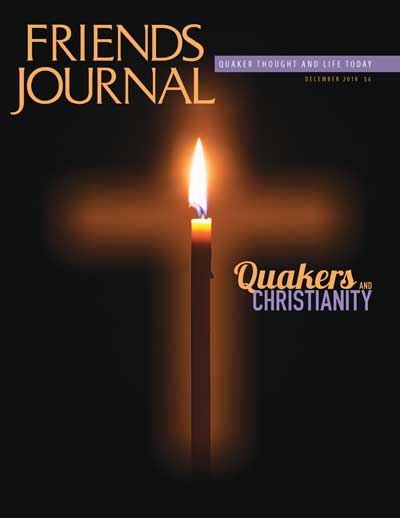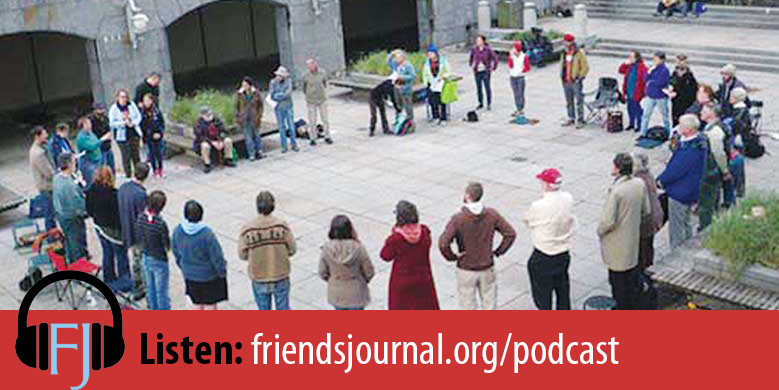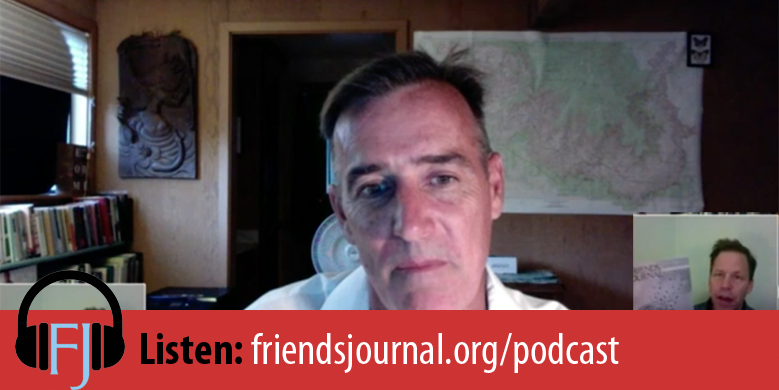Money as a gift
Lola Georg’s article “Money as Mutual Blessing” (FJ Oct.) was wonderful. I hope it is of use to many meetings. Perhaps the only thing to add is that George Fox’s words were grounded in the biblical ones from Matthew 6:30–33:
will he [God] not much more clothe you, oh you of little faith? So do not worry, saying, ‘what shall we eat?’ or ‘what shall we drink?’ or ‘what shall we wear?’ . . . [for] your heavenly father knows that you need them. But seek first his kingdom, and all these things will be given to you as well.
When you overcame yourself, Lola, and reached out to the homeless man, you were effectively seeking first God’s kingdom, and indeed, much good came of your gesture. This is a profound lesson.
Surely the same principles can be applied to all our money issues. Trusting that God knows what is needed in any given situation, it is for us to seek and discern, as best we can, what God’s wishes might be, and—having done on a practical level what we can, with the desire to put our resources to the most “kingdomly” use—then to leave the rest in God’s hands. I learned to do this with my material means, and since have never had any anxiety nor any material need.
Elizabeth. Hobart, Tasmania
I concur that taking the time to become better acquainted with those around you begets mutual confidence in each relationship. That confidence is the foundation on which a meeting, or any other successful organization can flourish.
Just like one’s own skills and talents, money is a gift from God, to be nurtured and utilized well while we’re on this earth. And in the end you can’t take it with you! At times, nurturing and utilizing money with purpose requires us to take or assume risk. The mutual confidence developed through better acquaintance with those in organizations that we care about is what provides each of us with the ability to assume risk, whether as an individual or as a part of that group.
Joe. Philadelphia, Pa.
In the early 2000s, a Central Philadelphia (Pa.) Meeting member lifted up an issue about almost two million enslaved children working under hazardous conditions on cocoa farms in West Africa. Subsequently, in 2010, CPMM approved, as a first step, a minute for the meeting to purchase only Fair Trade coffee and chocolate. Since then, we have learned that the tea we drink for soothing ourselves, even from reputable companies, often comes from plantations where workers live in extreme poverty and have no voice. The meeting was led this year to approve a revised Fair Trade minute that added tea to the list of coffee and chocolate products; it reads:
As a meeting, we seek to abstain from purchasing products of abhorrent labor practices, including slave labor, child labor and forced labor. One way to do this is to purchase Fair Trade products. Central Philadelphia Meeting commits to purchasing certified Fair Trade chocolate, coffee and tea products for the use of our meeting. We encourage meeting members to consider their own personal purchasing practices of Fair Trade products. There are many other products that demand our attention: sugar, bananas, avocados, spice, etc. as well as the clothes we wear daily. As we look back, John Woolman refused to wear slave-made cotton in the eighteenth century. There were other times when ordinary women and men boycotted products that were unethically sourced. To select and purchase Fair Trade products is sometimes called a kind of “buycott.” Boycott or buycott, the motivation behind those who participate is the same. We recognize our CPMM minute to be one of many steps we need to take if we want our individual and cooperative daily purchases to express our belief in working towards equality in the world.
My ministry of Fair Trade has been under the care of the meeting since 2016. I would appreciate hearing if other meetings have a minute similar to ours or if they serve Fair Trade products during fellowship hour.
Yoko Koike Barnes (barnes.yoko@gmail.com)[mailto:barnes.yoko@gmail.com]. Philadelphia, Pa.
Finding fellowship and peace
I have been a member of a Friends meeting for several years, and at the same time I have also been a member of a Unitarian Universalist Fellowship. My UU membership goes back decades. I love Quaker worship, the silence, the Light within, and also the commitment to God and social justice. Both denominations, however, are struggling to find their voice, to grow, and to survive. At least that’s how I experience it. Both of the fellowships I attend are right down the street from each other. One week I go to the Quakers and the next to the UU. I make jokes about both fellowships merging and meeting in the middle at an abandoned building that used to be a car repair shop. I need both because both provide me with good fellowship and peace. Both fellowships suffer because they spend so much of their time and money worrying about property, buildings, and stuff. They get bogged down in politics and doing things like they’ve always done. Sometimes I want to run away from both! Looks like I’ll just have to create my own spirituality and just pulsate between the two bodies.
Richard Gordon Zyne. Baldwin, Md.
Quakers responding to the rise of fascism in the 1930s
Before World War Two, some Quakers were condemned for conversing with Nazis. Corder Catchpool was one. He considered some to be friends and any worth talking to—he condemned none. By doing so he managed to save the lives of Jews, Socialists, Communists, and comforted many. He certain did listen to the oppressed. Lucy Duncan’s quotation of Henry Cadbury was in mid-1934, early in the story. I wonder if he learned from the criticism he received and if he tempered his perspective. Jews were speaking their message, and Germans suffered terribly for not listening. We must speak however we can truthfully. But dealing with evil can be confused with not talking to evildoers. This is a responsibility too, and it may fall on those not immediately harmed.
Stuart Bartram. Wayland, N.Y.
While not identifying as Quaker myself, I have attended a few Friends meetings with a lifelong Quaker friend. I enjoy receiving emails about new articles and find them quite interesting, both practically but more so spiritually.
This article for example. Wow. Bulls eye. I struggle constantly with the battle between the need for civility in our world and the need to stand up for what is right. It is a fine line that I find myself tripping over quite frequently. For many years I have lived by the base rule: “I must be treated with dignity and respect regardless of the cost.” For example, bullies as children often remain bullies as adults but manifest differently but just as oppressively. When I find someone attempting to bully me or someone else, those around me believe it is better to turn a blind eye, keep their complaints quiet, and remain civilized in order to maintain harmony. I find this very difficult to accept. I have perhaps an overly assertive need to see a bully named as such. When “civility” is positioned as a higher priority than fundamental decency then “civilization” becomes a contradiction in terms. The skill I struggle to develop is to call out such behavior for what it is but in a spiritually and diplomatically sound yet unambiguously assertive manner, understanding that “dignity and respect [for all] must be maintained regardless of the cost”. I’d be very interested to hear a Quaker community response to this.
Ian Casey. Oakville, Ontario
We only know in hindsight it took a world war and 50 million dead before Fascism was decisively defeated. And it was not stopped by the resistance of all elements of the German people themselves.
We are facing a similar situation in America. We see all the familiar dark clouds amassing, from above and below, hoping against hope that normality will return by being “more civil than thou,” while incivility reigns supreme from the Oval Office. And without any sacrifice beyond voting and then relying on our elected officials to act on our behalf. Well, what if the Blue Wave succeeds, and they don’t act on our behalf? What if the situation is judged to be so precarious by then that the Democrats prefer “order”—i.e. continuing their interminable appeal to the Republicans to at long last “do right”—over justice, an “order” that is conducive to their narrowly conceived, more (supposedly) promising political fortunes in 2020, while the dangerous rot continues apace?
Helen Klein. Atlanta, Ga.
One way to call out hurtful behavior is to use the Quaker tool of the query by asking for clarification. Ask the person who has just made a racial or sexist slur if they are saying all members of that group share the characteristic they have just indicated—lazy, loud, whiny, ignorant, unhygienic, mercenary. People caught making a micro aggression may backtrack and deny that all are nor that way, there are exceptions. Then maybe it can be agreed upon that we’re all unique. If the person is incontrovertibly racist or sexist or anti-Semitic, I have in the past made an “I” statement in that “my experience has been different.” I use living in Miami as a way to testify to the richness of diversity and how my children have benefitted from growing up with all kinds of people. Sometimes, if the person seems reasonable, a good question is “what is your concern?” Then you can focus on the root problem not the people or person.
Kathy Hersh. Miami, Fla.
Values as a crutch
Many thanks for the Student Voices issue (FJ May) addressing the question “What are \
Quaker values?” There is much inspiration, challenge, and hope in these \
Pages. And yet I couldn’t help noticing how many writers fall back on “SPICES” and how many ways they use the second S. Stewardship, social justice, and service—and there may be others—may indeed be central values for many of us. When they arise from our experience of the Divine, we may indeed name them “testimonies.” And yet I can’t shake a nagging sense that these words are chosen mostly because of their initial letter. “SPICES” can be a useful memory aid for Friends. Is it becoming a crutch, or (worse) an idol? In pondering this question, I especially appreciate Asha Sanaker’s caution (p. 29) against making our values “rote and recitable, rather than recalling the raging torrent of Spirit that flooded through early Friends . . .” Yes.
Deborah Townsend. Burien, Washington
Gender in Quaker school students
Sawyer Beveridge’s entry in the 2018 Student Voices Project is not only brave, but also the voice of so many young people who have felt afraid to pronounce their true selves (“Would You Still Love Me If I Were a Boy?,” FJ May). My child is a trans male, age 17, and still in high school. Charlie is walking a difficult path, but is deeply loved by our family and supported by Friends meeting here in Rhode Island. Still, there are good days and rough days, and so much more to come. Thank you for sharing your story. Much love and courage to you!
Tyger Lewis. Providence, R.I.
Sawyer is not alone. I know of another kid ten years ago at a Friends school who faced a similar situation. The right way for him and everyone around him to handle it was a Quakerly way—keeping it simple, upholding equality even when that’s hard, defusing conflicts before they erupt, everybody speaking their personal truth, and giving priority to the community and to serving one another.
Each situation has its own challenges, and the beauty is in helping each person’s unique light shine bravely. When that happens, everyone involved benefits and everyone who knows them gets richer in wisdom and love.
Andy. N.Y.
We are all conditioned to see our gender as something fixed at birth and that we need to conform to. In my experience, many of us don’t fit neatly into one of the two boxes, and spend our lives trying to adjust the parts of ourselves that don’t fit with the gender stereotypes. Sawyer’s situation goes further than most, I suspect, but as a “heterosexual” man I have struggled most of my life with the feeling in some situations that I would have fit better as a woman. I think that we have a freedom in our age to explore who we are spiritually which people in other times and ages had to a much lesser extent. Nonetheless, society still likes to put us into boxes, and if the boxes don’t fit then that creates tension and friction.
We are the ones who (eventually) change the shape of the boxes or remove them altogether, as Nelson Mandela succeeded in doing. As a child, he was one of my great heroes—one who stood for the oppressed at such great personal loss.
Vivian Barty-Taylor. Den Hoorn, The Netherlands
### Quaker values for parents
Thank you for the issue of the Journal dedicated to exploring the meaning of Quaker values in our lives today. An additional contribution of our values and testimonies, one I have found during the 40 years I have been listening to parents, lies in the guidance they give to parents. Parents tend to be overwhelmed and even lost in the current mass of advice swarming around them as to how they should nurture their children. Quaker values and testimonies, spiritually based and tested over time, give parents a vision of the attitudes, information, and skills their children are going to need 20 or 30 years from now in whatever kind of world they find themselves in. Parents ask of whatever current situation they are dealing with, “Trying to live by the testimonies, how should I deal with this situation?” or “Does this situation offer opportunities to help my children learn the attitudes, information, and skills they will need if their lives are to be illustrative of the testimonies 20 or 30 years from now?” Discerning the meaning of our Quaker values and testimonies and integrating them into our lives with our children is part of Quaker parents’ spiritual journey.






Comments on Friendsjournal.org may be used in the Forum of the print magazine and may be edited for length and clarity.